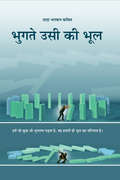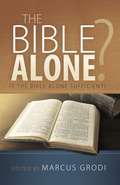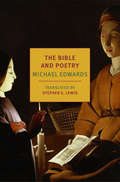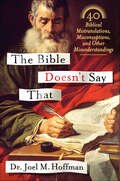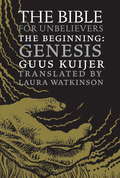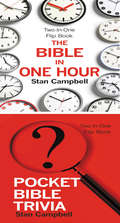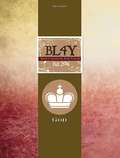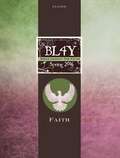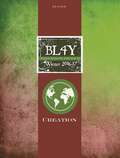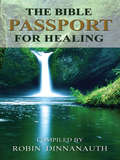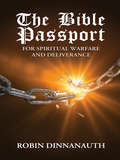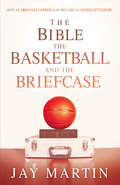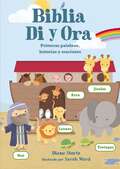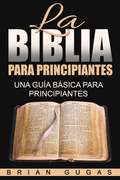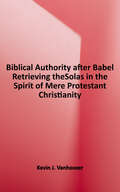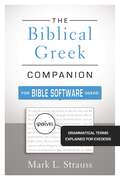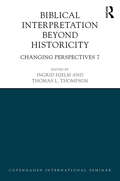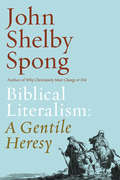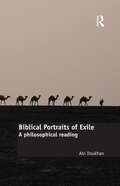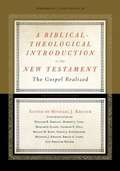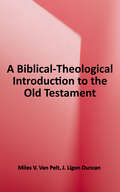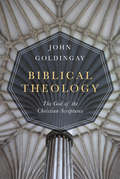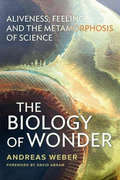- Table View
- List View
Bhugate Uski Bhool: भुगते उसी की भूल
by Dada Bhagwanजो दुःख भोगे तो उसकी भूल और सुख भोगे तो उसका इनाम। लेकिन भ्रांति का कानून निमित्त को पकड़ता है। भगवान का कानून, रीयल कानून, तो जिसकी भूल होगी, उसको पकड़ेगा। वह कानून एक्ज़ेक्ट है और उसमें कोई परीवर्तन कर सके, ऐसा है ही नहीं। ऐसा कोई कानून जगत् में नहीं है जो किसी को ‘भुगतना’ [दुःख] दे सके। जब कभी हमें अपनी भूल के बिना भुगतना पड़ता है, तब हृदय को चोट लगती है, और वह पूछता है – मेरा क्या कसूर है ? मैंने क्या गलत किया ? भूल किसकी है ? चोर की या जिसका चुराया गया है उसकी ? इन दोनों में से कौन भुगत रहा है ? “जो भुगते उसीकी भूल”। प्रस्तुत संकलन में, दादाश्री ने “भुगते उसीकी भूल” का विज्ञान प्रकट किया है। इसे प्रयोग में लाने से आपकी सारी गुत्थियाँ सुलझ जाएँ, ऐसा अनमोल यह सूत्र है।
The Bible Alone?: Is The Bible Alone Sufficient?
by Marcus GrodiThe Bible Alone? presents a competing look at the biblical roots, historical precedent, and logic behind using only the Bible as an infallible source of truth. This short book affirms the importance of Scripture as a divinely given foundation for our faith and also encourages the reader to consider the need for an authority established by Christ for its trustworthy interpretation. The Bible Alone? was edited by Marcus Grodi and includes contributions from various authors, including: -- Jimmy Akin - Some Practical Problems with Sola Scriptura -- Dave Armstrong - The Perspicuity ("Clearness") of Scripture -- Marcus Grodi - The Illogical Logic of Sola Scriptura -- Rev. Dwight Longenecker - The Problem with the Canon -- Rev. Brian w. Harrison - More Illogic Concerning Sola Scriptura -- David Palm - Oral Tradition and the New Testament -- Mark P. Shea - When Tradition is Treated Like Revelation -- Joseph Gallegos - Did the Church Fathers Believe in Sola Scriptura? -- Dr. Kenneth Howell - St. Augustine and Sola Scriptura
The Bible and Poetry
by Michael EdwardsA fresh, provocative look at the link between poetry and Christianity, both as it relates to the Bible itself as well as to Christian and religious life, by an accomplished scholar. The Bible is full of poems. In the Old Testament, there are the Psalms and the Song of Songs, the great exhortations and lamentations of the Prophets, and passages of poetry woven in throughout. In the New Testament, Jesus describes the kingdom of heaven with poetic epithets such as &“a treasure hid in a field,&” calling the Son of God &“the true vine,&” &“the light of the world,&” &“the good shepherd,&” and &“the way, the truth, and the life.&” The Gospels reverberate with allusions to the poetry of the Old Testament; the last book of all is Revelation, a visionary poem. The Bible, in other words, asks to be read poetically from start to end, and yet readers have rarely considered what that might mean, much less heeded that call.In The Bible and Poetry, the poet and scholar Michael Edwards reshapes our understanding of the Bible and religious belief, arguing that poetry is not an ornamental or accidental feature but is central to both. He speaks personally of his early, unanticipated, transformative encounters with scripture. He offers close, insightful, and resonant readings of biblical passages. Poetry, as he sees it, is the vital and necessary medium of the Creator&’s word, and the truth of the Bible is not a question of precepts and propositions but of a direct experience of its poetry, its power.
The Bible Doesn't Say That: 40 Biblical Mistranslations, Misconceptions, and Other Misunderstandings
by Joel M. HoffmanThe Bible Doesn't Say That explores what the Bible meant before it was misinterpreted over the past 2,000 years. Acclaimed translator and biblical scholar Dr. Joel M. Hoffman walks the reader through dozens of mistranslations, misconceptions, and other misunderstandings about the Bible. In forty short, straightforward chapters, he covers morality, life-style, theology, and biblical imagery, including: *The Bible doesn't call homosexuality a sin, and it doesn't advocate for the one-man-one-woman model of the family that has been dubbed "biblical." *The Bible's famous "beat their swords into plowshares" is matched by the militaristic, "beat your plowshares into swords." *The often-cited New Testament quotation "God so loved the world" is a mistranslation, as are the titles "Son of Man" and "Son of God." *The Ten Commandments don't prohibit killing or coveting. What does the Bible say about violence? About the Rapture? About keeping kosher? About marriage and divorce? Hoffman provides answers to all of these and more, succinctly explaining how so many pivotal biblical answers came to be misunderstood.
The Bible for Unbelievers: The Beginning-Genesis
by Guus Kuijer Laura WatkinsonOne of Northern Europe's most popular writers, Guus Kuijer was fascinated with the Bible from an early age, but was never able to believe it, no matter how hard he tried. Now, in prose that is humorous and sometimes irreverent, Kuijer reinterprets the most popular book in the world, making it new again for the twenty-first century and for the first time rendering it accessible to "unbelievers"—that is, to people who are ready to appreciate it as something other than a sacred text. The first volume of The Bible for Unbelievers tells the story of the Book of Genesis as an agnostic novel in which man's curiosity causes creation, not God alone. Kuijer explores the nagging loneliness of the universe before creation. He asks if man and woman are indeed God's handiwork or vice versa. The entire cast of characters in this Bible is imperfect, a little lawless, and at times fumbling and jealous—God included. Kuijer's afterword tells us that no story can "come to life unless the storyteller makes it his or her own." There's a charming invitation in these pages for us all to dare to revisit our founding myths and the roles we play in them. The Bible for Unbelievers is here to draw us into questions that have no answers. It does so not with fear or religiosity, but with joy.
The Bible in One Hour & Pocket Bible Trivia
by Stan CampbellTwo entertaining and enlightening works in a portable, flip book format: a quick-yet-comprehensive survey of the Bible and a Bible trivia game that's fun to play alone or with friends. What if you could learn more about the entire Bible and its most fascinating people in just an hour? You can in this quick-yet-comprehensive survey of the world's bestselling book. From Genesis to Revelation, the ONE-HOUR BIBLE will sweep you from the wonders of the Earth's first days to the dynamic prophecies of the Earth's last days--and everything in between! No matter whether this is your first introduction to the stories in the Bible or simply a refresher, you'll enjoy the fun approach of this user-friendly guide and gain a greater understanding of God's love along the way. When you've finished the ONE-HOUR BIBLE, POCKET BIBLE TRIVIA will help you test what you've learned on your own or with friends. Fun for all ages and those with any level of biblical knowledge, these twenty-one chapters with over 400 questions will challenge and entertain you. And this portable volume can be taken anywhere you go.
Bible Lessons for Youth Fall 2016 Leader: God
by Jenny Youngman Lara Blackwood Pickrel Lee Yates Julie ConradyThe fall quarter of BLY explores the sovereign nature of God as seen through the eyes of the men who wrote the books of Isaiah, Hebrews, and Revelation. Isaiah helps us visualize God as the one who rules the whole universe. In Hebrews, we see how God comes to lead humankind in the person of Jesus. Finally, John helps us see God as the beginning and end of all things. This trust curriculum has been refreshed, while keeping everything you love about the resources. Bible Lessons for Youth is a comprehensive 6-year Bible-to-life curriculum that helps teens apply the Bible to their real-life. Its teacher-friendly format is built around a step-by-step sequence with thought-provoking activities designed to help youth understand Scripture and apply it to their individual experiences. The Leader Guide makes teaching Bible Lessons for Youth easy with each session broken up into small segments. Complete Scripture texts are printed in all books. (No need to pause while everyone hunts for the appropriate verse.) At any time during the quarter you can refer back to the convenient Overview section found at the front of the guide and also take a moment to read the Teaching Tools article provided at the back of the guide. Don't forget to check out the Out and About activity that will allow your students to take what they learn in Sunday school outside the classroom, enhancing their faith journey.. Begin The Bible Lessons for Youth format of "Explore," "Focus," and "Connect" is an intentional learning approach to help teens FOCUS on the original context, EXPLORE how the passage speaks to their lives, and CONNECT with how to live out God's Word in their daily lives and in the world. Key Verse Taken from the passage printed in the student book, this verse can be used to emphasize Scripture memorization in your class. Take-Away This is the basic point of the lesson and is summed up in a short sentence. It's the big idea you want your teens to grasp from each week's session. Bible Lesson For easy access, the Scripture passage your class or group will explore is taken from the Common English Bible, and are coordinated with the Uniform Lesson Series. Contains options for younger and older youth. Fall Theme: Community (Acts)
Bible Lessons for Youth Spring 2016 Leader
by Jason Sansbury Mike Poteet Julie Conrady Mary Bernard Jacob FasigSpring Theme: Faith (Mark, Luke) This trust curriculum has been refreshed, while keeping everything you love about the resources. Bible Lessons for Youth is a comprehensive 6-year Bible-to-life curriculum that helps teens apply the Bible to their real-life. Its teacher-friendly format is built around a step-by-step sequence with thought-provoking activities designed to help youth understand Scripture and apply it to their individual experiences. Designed to make teaching Bible Lessons for Youth to your youth easy with each session broken up into small segments. The student book is reproduced as the center piece of each session in the leader guide and is surrounded by the minute-by-minute teaching plans printed in the margin. The instructions are provided for student book activities, discussion questions, illustrative games and short drama skits. Complete Scripture texts are printed in all books. (No need to pause while everyone hunts for the appropriate verse.) At anytime during the quarter you can refer back to the convenient Overview section found at the front of the guide and also take a moment to read the "Teaching Tools" article provided at the back of the guide. Don't forget to check out the "Out and About" activity that will allow your students to take what they learn in Sunday school outside the classroom, enhancing their faith journey. Begin The Bible Lessons for Youth format of "Explore," "Focus," and "Connect" is an intentional learning approach to help teens FOCUS on the original context, EXPLORE how the passage speaks to their lives, and CONNECT with how to live out God's Word in their daily lives and in the world. Key Verse Taken from the passage printed in the student book, this verse can be used to emphasize Scripture memorization in your class. Take-Away This is the basic point of the lesson and is summed up in a short sentence. It's the big idea you want your teens to grasp from each week's session. Bible Lesson For easy access, the Scripture passage your class or group will explore is taken from the Common English Bible, and are coordinated with the Uniform Lesson Series. Contains options for younger and older youth.
Bible Lessons for Youth Winter 2016-17 Leader: Creation
by Sally Hoelscher Tim Gossett Jason Sansbury Lee Yates Mike PoteetThis trust curriculum has been refreshed, while keeping everything you love about the resources. Bible Lessons for Youth is a comprehensive 6-year Bible-to-life curriculum that helps teens apply the Bible to their real-life. Its teacher-friendly format is built around a step-by-step sequence with thought-provoking activities designed to help youth understand Scripture and apply it to their individual experiences. Designed to make teaching Bible Lessons for Youth to your youth easy with each session broken up into small segments. The student book is reproduced as the center piece of each session in the leader guide and is surrounded by the minute-by-minute teaching plans printed in the margin. The instructions are provided for student book activities, discussion questions, illustrative games and short drama skits. Complete Scripture texts are printed in all books. (No need to pause while everyone hunts for the appropriate verse.) At anytime during the quarter you can refer back to the convenient Overview section found at the front of the guide and also take a moment to read the "Teaching Tools" article provided at the back of the guide. Don't forget to check out the "Out and About" activity that will allow your students to take what they learn in Sunday school outside the classroom, enhancing their faith journey. Begin The Bible Lessons for Youth format of "Explore," "Focus," and "Connect" is an intentional learning approach to help teens FOCUS on the original context, EXPLORE how the passage speaks to their lives, and CONNECT with how to live out God's Word in their daily lives and in the world. Key Verse Taken from the passage printed in the student book, this verse can be used to emphasize Scripture memorization in your class. Take-Away This is the basic point of the lesson and is summed up in a short sentence. It's the big idea you want your teens to grasp from each week's session. Bible Lesson For easy access, the Scripture passage your class or group will explore is taken from the Common English Bible, and are coordinated with the Uniform Lesson Series. Contains options for younger and older youth.
The Bible Passport for Healing
by Robin DinnanauthThe Bible Passport for Healing was compiled out of my personal experience with every scriptures that is quoted in this book. The bible says in Joshua 1:8 Keep this Book of the Law always on your lips; meditate on it day and night, so that you may be careful to do everything written in it. Then you will be prosperous and successful. I pray as you meditate on every scripture that is mention in this Bible Passport, you will have a supernatural experience with God and receive your healing miraculously. The promises of God is Yea and Amen. God's word will never return void to him. So mediate on these scriptures and let God do the works of his promises.
The Bible Passport for Spiritual Warfare & Deliverance
by Robin DinnanauthYou have now put your hand on the most dynamic powerful scriptural promises from God's Word, which can be used in your meditation and prayer to war against the forces of evil or to destroy any plans and schemes of the enemy: The purpose of this mighty strategic Spiritual Warfare and Deliverance Book is to take you into the spirit realm through the scriptures and pull down every stronghold of the adversary, breaking the power of witchcraft, destroying generational curses and cut every ungodly spiritual soul-ties. Pulling down strongholds of spiritual fortified gates of Hell with god's prevailing power and authority. The bible says, "For God hath not given us the spirit of fear; but of power, and of love, and of a sound mind." (II Timothy 1:7) You must be solid in doctrinal truth and Biblical principles and we must be confident in God's ability through us! "...greater is he that is in you, than he that is in the world." I John 4:4
The Bible, The Basketball, and The Briefcase: How An Arkansas Lawyer Also Became An Inner City Pastor
by Jay MartinAs a promising new lawyer, Jay Martin would have seem like a guy out of place in the projects of Little Rock, Arkansas, shooting hoops, befriending fatherless kids, and introducing them to Jesus. Since then, Jay has enjoyed a prominent career in law and politics. Yet, despite his vocational demands, Jay continued his outreach. Today it has grown into a vital ministry that is reaching hundreds of Little Rock&’s needy kids and their families for Christ. As an eye-witness of what God can do with someone who wants to make a difference, Jay presents ample evidence for why your vocation need not limit your ministry potential. His story is convincing testimony that, no matter how demanding your career is, if you have a passion for helping others, then Jesus is ready to use you!
Biblia Di y Ora: Primeras palabras, historias y oraciones
by Diane StortzHistorias bíblicas sencillas para niños de uno a cuatro años de edad, presentadas con texto fácil de comprender e imágenes coloridas para que los niños las señalen, nombren y aprendan. Una herramienta atractiva para que los padres enseñen a sus hijos la palabra de Dios en una forma entretenida y adecuada para su edad. Escucha la historia bíblica, repite el versículo, ora y encuentra los objetos clave en cada página.¡Lea y aprenda de la Biblia con sus hijos! Experimente la Biblia junto a sus niños en una manera nueva y diferente. Los niños disfrutarán señalando y nombrando objetos en cada página para el aprendizaje temprano. Lo que es más importante, descubrirán sus historias bíblicas favoritas, apropiadas para su edad con versículos de las Escrituras y oraciones breves que también guardan la Palabra de Dios en los corazones de los niños.
La Biblia para principiantes: una guía básica para principiantes
by Brian Gugas Paula De MonteDescripción del libro: A lo largo de los tiempos, las personas han acudido a la Biblia en busca de guía y esperanza. Este libro de estudio de la Biblia sirve como un mapa de carreteras para que los principiantes puedan desarrollar una apreciación de la Biblia y convertirla en parte de su vida diaria. Los 66 libros de la Biblia se tratan en detalle, incluidos los siguientes temas: * Autor de cada libro y el marco de tiempo en el que se escribió. * Temas principales de cada libro. * Resumen del mensaje de cada libro. * Un devocional para la meditación y un mayor análisis. Sumérjase en las historias, las profecías y los mensajes de la Biblia y vuelva a descubrir la fuerza que inspira sobrecogimiento, misericordia y el poder sanador de Dios y Jesucristo. Llena de gracia e inspiración, Guía de estudio de la Biblia para principiantes hace volver al lector a los aspectos básicos y abre el camino hacia una relación directa con la Palabra viva de Dios.
Biblical Authority After Babel: Retrieving the Solas in the Spirit of mere Protestant Christianity
by Kevin J. VanhoozerHow the Five Solas Can Renew Biblical Interpretation In recent years, notable scholars have argued that the Protestant Reformation unleashed interpretive anarchy on the church. Is it time to consider the Reformation to be a 500-year experiment gone wrong? World-renowned evangelical theologian Kevin Vanhoozer thinks not. While he sees recent critiques as legitimate, he argues that retrieving the Reformation's core principles offers an answer to critics of Protestant biblical interpretation. Vanhoozer explores how a proper reappropriation of the five solas--sola gratia (grace alone), sola fide (faith alone), sola scriptura (Scripture alone), solus Christus (in Christ alone), and sola Deo Gloria (for the glory of God alone)-- offers the tools to constrain biblical interpretation and establish interpretive authority. He offers a positive assessment of the Reformation, showing how a retrieval of "mere Protestant Christianity" has the potential to reform contemporary Christian belief and practice. This provocative response and statement from a top theologian is accessibly written for pastors and church leaders.
Biblical Criticism in Early Modern Europe: Erasmus, the Johannine Comma and Trinitarian Debate.
by Mcdonald Grantley RobertMedieval western theologians considered the Johannine comma (1 John 5:7-8) the clearest biblical evidence for the Trinity. When Erasmus failed to find the comma in the Greek manuscripts he used for his New Testament edition, he omitted it. Accused of promoting Antitrinitarian heresy, Erasmus included the comma in his third edition (1522) after seeing it in a Greek codex from England, even though he suspected the manuscript's authenticity. The resulting disputes, involving leading theologians, philologists and controversialists such as Luther, Calvin, Sozzini, Milton, Newton, Bentley, Gibbon and Porson, touched not simply on philological questions, but also on matters of doctrine, morality, social order, and toleration. While the spuriousness of the Johannine comma was established by 1900, it has again assumed iconic status in recent attempts to defend biblical inerrancy amongst the Christian Right. A social history of the Johannine comma thus provides significant insights into the recent culture wars. Gives the first detailed account of the debate over the textual basis for the doctrine of the Trinity, from the sixteenth to the twentieth century Shows how biblical philology was not simply the preserve of scholars, but was a subject of broad social interest in the early modern period, with serious political implications Provides rich philological detail in an accessible style
The Biblical Greek Companion for Bible Software Users: Grammatical Terms Explained for Exegesis
by Mark L. StraussThe Biblical Greek Companion for Bible Software Users helps users understand the exegetical significance of Greek grammatical terminology identified by the program. This resource provides students who utilize biblical language software the insight they need to make sense of the data provided by the program, giving them deeper insight into the biblical text that they could not get by solely reading an English translation. The Biblical Greek Companion for Bible Software Users is ideally suited for: Pastors and ministry leaders who may have learned Greek at one time but have experienced the loss of much of that learning College and seminary students who are learning Greek and need a guide to help understand the significance of the grammatical terminology Bible software users who never formally learned Greek in the classroom and need help understanding the meaning of the terms they encounter With grammatical terms laid out and discussed in an intuitive and user-friendly format, readers can now spend time focusing on exegesis and applying their findings to their preaching, teachings, study, and writing instead of puzzling over the significance of grammatical terminology and how to apply it.
Biblical Interpretation Beyond Historicity: Changing Perspectives 7
by Thomas L. Thompson Ingrid HjelmBiblical Interpretation beyond Historicity evaluates the new perspectives that have emerged since the crisis over historicity in the 1970s and 80s in the field of biblical scholarship. Several new studies in the field, as well as the ‘deconstructive’ side of literary criticism that emerged from writers such as Derrida and Wittgenstein, among others, lead biblical scholars today to view the texts of the Bible more as literary narratives than as sources for a history of Israel. Increased interest in archaeological and anthropological studies in writing the history of Palestine and the ancient Near East leads to the need for an evidence-based history of Palestine. This volume analyses the consequences of the question: "If the Bible is not history, what is it then?" The editors, Hjelm and Thompson are members of the Copenhagen School, which was formed in the light of this question and the commitment to a new approach to both the history of Palestine and the Bible’s place in ancient history. This volume features essays from a range of highly regarded scholars, and is divided into three sections: "Beyond Historicity", which explores alternative historical roles for the Bible, "Greek Connections", which discusses the Bible’s context in the Hellenistic world and "Reception", which explores extra-biblical functions of biblical studies. Offering a unique gathering of scholars and challenging new theories, Biblical Interpretation beyond Historicity is invaluable to students in the field of Biblical and East Mediterranean Studies, and is a crucial resource for anyone working on both the archaeology and history of Palestine and the ancient Near East, and the religious development of Europe and the Near East.
Biblical Literalism: A Gentile Heresy
by John Shelby SpongA global and pioneering leader of progressive Christianity and the bestselling author of Why Christianity Must Change or Die and Eternal Life explains why a literal reading of the Gospels is actually heretical, and how this mistaken notion only entered the church once Gentiles had pushed out all the Jewish followers of Jesus.A man who has consciously and deliberately walked the path of Christ, John Shelby Spong has lived his entire life inside the Christian Church. In this profound and considered work, he offers a radical new way to look at the gospels today as he shows just how deeply Jewish the Christian Gospels are and how much they reflect the Jewish scriptures, history, and patterns of worship. Pulling back the layers of a long-standing Gentile ignorance, he reveals how the church's literal reading of the Bible is so far removed from these original Jewish authors' intent that it is an act of heresy.Using the Gospel of Matthew as a guide, Spong explores the Bible's literary and liturgical roots--its grounding in Jewish culture, symbols, icons, and storytelling tradition--to explain how the events of Jesus' life, including the virgin birth, the miracles, the details of the passion story, and the resurrection and ascension, would have been understood by both the Jewish authors of the various gospels and by the Jewish audiences for which they were originally written. Spong makes clear that it was only after the church became fully Gentile that readers of the Gospels took these stories to be factual, distorting their original meaning.In Biblical Literalism: A Gentile Heresy, Spong illuminates the gospels as never before and provides a better blueprint for the future than where the church's leaden and heretical reading of the story of Jesus has led us--one that allows the faithful to live inside the Christian story in the modern world.thor of Original Blessing"Jack Spong confounds biblical literalists by being profoundly biblical. This exciting book is liberating for those looking for a rational and authentic Christian faith that honors its biblical roots and is an essential building block in the search for a new Christianity for a new world."--Peter Francis, warden and director of Gladstone's Library, Wales"A brilliant challenge to biblical literalism, Bishop Spong reveals the tragic consequences of idolatry of the written word and why it matters today. A timely, important book."--Michael Dowd, author of Thank God for Evolution"After reading Spong's newest book, it will be difficult to read Matthew or any of the gospels in quite the same way again. He's done an amazing job of explaining how the book of Matthew was written as weekly liturgies for the Jewish synagogue year. A wonderful book."--Fred C. Plumer, president of ProgressiveChristianity.org
Biblical Portraits of Exile: A philosophical reading (Routledge New Critical Thinking in Religion, Theology and Biblical Studies)
by Abi DoukhanExile constitutes one of the most central experiences in the Bible, notably in the book of Genesis. The question has rarely been asked however as to why exile plays such an important role in the lives of Biblical characters. Biblical Portraits of Exile proposes a philosophical reading largely inspired by the philosophy of Emmanuel Levinas of the experience of exile in the book of Genesis. Focusing on the 8 central figures of exile Adam, Eve, Cain, the sons of Shem, Abraham, Rebekah, Jacob and the sons of Levy the book draws out the ethical and redemptive implications of exile and thereby paves the way for a renewed description of the human subject, one that situates ethics at its very core.
A Biblical-theological Introduction To The New Testament: The Gospel Realized
by Michael J. Kruger Guy P. Waters J. Ligon Duncan William B. Barcley Robert Cara Benjamin Gladd Charles E. Hill Reggie M. Kidd Simon J. Kistemaker Bruce A. LoweRead the New Testament from a biblical-theological perspective. <p><p> Featuring contributions from nine respected evangelical scholars, this volume introduces each New Testament book in the context of the whole canon of Scripture, helping anyone who teaches or studies the Bible to apply it to the church today.
A Biblical-Theological Introduction to the Old Testament: The Gospel Promised
by Miles V. Van PeltWritten from a Reformed, covenantal, and redemptive-historical perspective, this introduction to the Old Testament invites readers to see the cohesive story of the Bible through the lens of the gospel promised from the beginning.
Biblical Theology: The God of the Christian Scriptures
by John GoldingayImagine someone who has spent a lifetime listening deeply and attentively to the full range of Scripture's testimony. Stepping back, they now describe what they have seen and heard. What emerges is a theological cathedral, laid out on the great vectors of Scripture and fitted with biblically sourced materials. This is what John Goldingay has done. Well known for his three-volume Old Testament Theology, he has now risen to the challenge of a biblical theology. While taking the New Testament as a portal into the biblical canon, he seeks to preserve the distinct voices of Israel's Scriptures, accepting even its irregular and sinewed pieces as features rather than problems. Goldingay does not search out a thematic core or overarching unity, but allows Scripture's diversity and tensions to remain as manifold witnesses to the ways of God. While many interpreters interrogate Scripture under the harsh lights of late-modern questions, Goldingay engages in a dialogue keen on letting Scripture speak to us in its own voice. Throughout he asks, "What understanding of God and the world and life emerges from these two testaments?" Goldingay's Biblical Theology is a landmark achievement—hermeneutically dexterous, biblically expansive, and nourishing to mind, soul and proclamation.
Biblical Worldview: Creation, Fall, Redemption
by Bju PressBiblical Worldview: Creation, Fall, Redemption Student Text was created to appeal to student interest and develop understanding. Application examples taken from history and recent events resonate with students, motivating them to apply Scripture to issues that are crucial to their spiritual growth. Apologetics is interwoven throughout the textbook, equipping students to defend the foundational teachings of the Bible against competing worldviews. At the same time, the framework of Creation, Fall, Redemption enables students to make distinctively Christian contributions to their culture.
Biology of Wonder: Aliveness, Feeling and the Metamorphosis of Science
by Andreas WeberThe disconnection between humans and nature is perhaps one of the most fundamental problems faced by our species today. The schism between us and the natural world is arguably the root cause of most of the environmental catastrophes unraveling around us. However, until we come to terms with the depths of our alienation, we will continue to fail to understand that what happens to nature also happens to us.In Healing Ecology author Andreas Weber proposes a new approach to the biological sciences that puts the human back in nature. He argues that feelings and emotions, far from being superfluous to the study of organisms, are the very foundation of life. From this basic premise flows the development of a "poetic ecology" which intimately connects our species to everything that surrounds us--showing that subjectivity and imagination are prerequisits of biological existence.Healing Ecology demonstrates that there is no separation between us and the world we inhabit, and in so doing it validates the essence of our deep experience. By reconciling science with meaning, expression and emotion, this landmark work brings us to a crucial understanding of our place in the rich and diverse framework of life-a revolution for biology as groundbreaking as the theory of relativity for physics. Dr. Andreas Weber is a German academic, scholar and author. He is a leader in the emerging fields of "biopoetics" and "biosemiotics," and his work has been translated into several languages and published around the globe.
